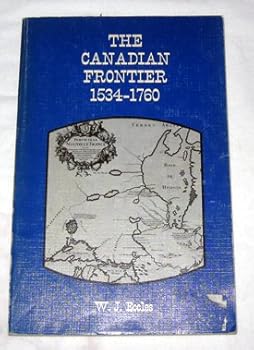The Canadian Frontier 1534-1760
(Part of the Histories of the American Frontier Series)
Select Format
Select Condition 
Book Overview
This account of the French era in Canada is the most original treatment of the subject in over a century. The analysis and ideas in the first edition helped create a whole new school of thought about... This description may be from another edition of this product.
Format:Paperback
Language:English
ISBN:0826303110
ISBN13:9780826303110
Release Date:January 1978
Publisher:University of New Mexico Press
Weight:0.82 lbs.
Customer Reviews
2 ratings
An Indispensable History Of New France
Published by Thriftbooks.com User , 21 years ago
"The Canadian Frontier" is an excellent exposition of the story of the interface between Canadian and native civilizations from 1534-1760. As the Canadian frontier included much of the Midwest, this book is a good choice for both American and Canadian readers with an interest in the history of New France.Prof. Eccles makes the point that the Canadian frontier is conceptionally different from the American frontier. The American frontier was a geographical concept, the line where settlement gave way to wilderness. The Canadian frontier, by contrast, was a series of settled islands in a sea of wilderness at which civilization "did business" with native cultures.One test of a good historical book is whether it changes the reader's view of history. This one passes that test. I had always viewed the competition between the French, British and Indians in North America as being based on basic nationalistic and tribal rivalries. Prof. Eccles explains the rivalry in terms of an economic competition over the fur trade. The roles of the Indians was to supply the furs. The locations of the trade shifted over time between the eastern settlements, western trading posts and in Indian villages at which traders visited. Traders competed in goods offered, while tribes competed, at times by war, to control access to traders and their goods. Middleman profits were often at stake.The economy of New France is contrasted with that of the British colonies. The economy of the British colonies was largely based on farming while the economy of New France was, primarily, extractive, based on the fur trade and, to a lesser extent, fishing. Farming in New France was, initially, merely to supply the settlers. As population increased and the fur trade declined, New France evolved from a trading to an agricultural colony.The trading pattern of New France determined land use practices as well as relations with the Indian tribes. I had always thought of low populations of New France as a reflection of the unwillingness of the French to migrate to North America. From this book I learned that low population density was indispensable to a fur trade based economy. Like the Spanish to the West, and unlike the English to the south, evangelization was a major part of the interaction on the Canadian Frontier. Much of the exploration and development was instituted or accompanied by missionaries.Over time, the Canadian Frontier was changed by tribal wars which determined the access of each tribe to western traders and their wares. Although Indians are often portrayed as victims of white aggression, the truth is that they acquired a dependency on European goods which contributed to their own downfall.The military aspects of the North American wars are interesting in that they relate the relative contributions of the Regular forces, the militia and the Indians. Another of my conceptions which was changed by this book was that the outcome of the French and Indian war was dict
The Canadian Frontier
Published by Thriftbooks.com User , 24 years ago
W. J. Eccles did a phenomenal job in covering the history of New France. I was expecting a dry history. I didn't get one. What I got was a story of men and a few women. This book is a facinating account of the settlement of Canada under the French. For a history book, it was hard to put down. Eccles brought the problems of starting and maintaining a colony to life. He presents historical figures like Frontenac and La Salle as real people who made real mistakes without excuses or whitewashing.I would recommend this book to anyone doing any type of research into New France.





